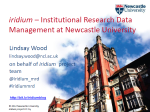March 8, 2012
by Lindsay Wood
A task assigned at the JISC MRD02 start-up meeting in Nottingham was to identify three key benefits that each project felt would be generated and indicate what evidence we felt would likely be be produced within and beyond the lifetime of the project.
Benefits and metrics were provided from the JISC MRD01 RDMI projects and Beagrie evaluation report:
http://www.jisc.ac.uk/media/documents/programmes/mrd/RDM_Benefits_FinalReport-Sept.pdf) [page 4].
Two major outcomes were identified in the iridium project plan:
i) an institutional research data management policy (as required by the funding councils)
Benefit = long-term road-maps for RDM
Metric = improvements overtime in benchmark results (e.g. surveys of awareness of relevant support services or funder requirements)
Benefit = improve data management plans and policies
Metric = re-use of infrastructure in new projects
ii) a costed business case for a sustainable institution-wide research data management infrastructure to support that policy
Benefit = Sustainability of research data infrastructure
[Metric = Institutional buy-in over long time period? Ratification of sustainable policy framework (???)]
Benefit = Cost modelling to plan for increasing demand
[Metric = Re-use of model/costed decisions to support new projects/policies; validated activity-based costing[1] (information discovery/retrieval/data loss[2] (???)]
I found sustainability and cost modelling metrics troublesome.
In the project plan, we also identified several other benefits.
iii) project plan (evaluation) benefits
Influence beyond project on other policies
Benefit = integrated thinking around RDM
Our metric = number of related policies revised/guided
Benefit= Data routinely discovered
Our metric = increased number of successful data requests
Benefit = Permanent change to practice
Our metric = reduced number of negative outcomes related to poor RDM practice
Other projects work on this task is here:
http://mrdevidence.jiscinvolve.org/wp/2011/12/16/evidence-gathering-session-at-the-jiscmrd-launch-workshop/
—-
[1] JISC MRD01 Outputs, http://www.jisc.ac.uk/whatwedo/programmes/mrd/outputs.aspx
[2] Sudamih project, http://sudamih.oucs.ox.ac.uk/



